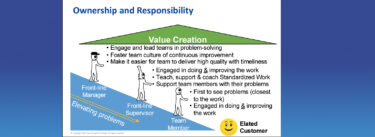One of the hardest things in my line of work is seeing a company make enormous strides in getting lean and yet fail to prosper. Today’s heartbreak is Delphi, the giant American auto-parts company that was one of the founding sponsors of LEI and which has been a test bed for our ideas and publications over the past eight years. As you may know, Delphi filed for bankruptcy on October 8 and is now in reorganization.
I have walked through dozens of Delphi facilities in many countries and in my recent walks I have seen some of the leanest practices I have ever found outside of Toyota City. Delphi retained the very best ex-Toyota sensei, pursued kaizen and kaikaku with a vengeance, and took out billions of dollars of operating costs. At the same time quality was dramatically improved (down to defects-per-million-parts in the single digits), responsiveness to changing customer requirements was enhanced, investment requirements for a given increment of capacity were slashed, and inventories shrank. In short, Delphi took all the necessary steps to transform its production system, but these steps alone weren’t sufficient.
So what went wrong? Delphi was caught in the middle between promises made to employees as it departed General Motors and demands from its largest customer (also GM at 50% of Delphi sales) as it struggled to adjust to today’s hypercompetitive world economy. When Delphi gained its freedom in 1999, the hope was that there would be enough time to make the transition. Delphi would honor wage and pension agreements with existing employees working on GM business in North America while it steadily diversified new business away from GM, which initially accounted for 90% of Delphi’s sales. Then as Delphi’s unionized workers in the U.S., working at very high “GM wages,” retired they would be replaced by young workers with “Tier One” wages comparable to those at Delphi’s competitors in the supplier industry. At the same time, GM would acknowledge Delphi’s cost problem on its GM business and keep price reduction demands in line with Delphi’s ability to remove costs.
For five years, as Delphi steadily increased its productivity through its lean initiative and as its high-wage workers retired, it seemed that the equation might work. But then energy prices zoomed, the big SUV and pickup segments where GM still made good margins stagnated, and lean competitors like Toyota launched products in each of GM’s remaining profitable niches. GM responded by pushing harder and harder on Delphi’s product pricing to a point where Delphi losses soared. (The irony for Lean Thinkers is that lean-leader Toyota beat GM and GM responded by beating up Delphi which has become one of Toyota’s most eager pupils. If only Delphi had Toyota as its major customer!)
Something had to give and Delphi decided that bankruptcy was the only way to deal with money-losing activities in the U.S. even as the company has had good financial performance elsewhere in the world, aided in every case by lean production.
So what’s the takeaway for lean thinkers? Simply fixing operations may not be sufficient if managers wait too late to start and factor costs (principally wages and healthcare costs these days) are too far out of line. Delphi will now go through a reorganization process in which the bankruptcy judge rather than senior managers, union leaders, or customers will decide how to divide the pain. And here is a contrarian prediction: I believe Delphi has a great future as the world’s leading car parts supplier once promises made in a much less competitive past are addressed. This is because the lean foundation for success has already been laid.
Many observers assume, of course, that a key step for Delphi will be to move practically all U.S. and West European operations to low labor-cost countries. And this may be part of the solution. But again, let me be a contrarian and point out that this step, although necessary in selected cases, can never be sufficient.
After all, anyone can chase labor. If Delphi simply moves all operations to China – assuming that this is the global low-cost location – but runs its operations like a mass producer, how can sustainable competitive advantage be gained as competitors pursue the same strategy at the same rate? In fact sustainable advantage lies in combining truly lean practices in product design, operations and logistics, purchasing, and customer touch with appropriate labor costs at the right location to serve specific customers.
What these costs are and where activities should be located depends on the specific customers to be served. (You’ll need some “lean math” to get the right answer.) But I predict that in many cases the right location for Delphi will be closer to the customer than most observers believe today. In any case, and for any company in any industry, only lean processes in the right location will prove both necessary and sufficient
Best regards,
Jim
Jim Womack
President and Founder
Lean Enterprise Institute
P.S. As a special premium to members of our Lean Community, I’m presenting a Lean Solutions webinar on Nov. 15, 2005, at 2:00 p.m. (Eastern). In this free one-hour event, I’ll describe lean provision and lean consumption as the critical compliments to lean production and the next leap for lean thinkers. [Editor’s Note: You can find this and other webinars in our webinar archive.]






